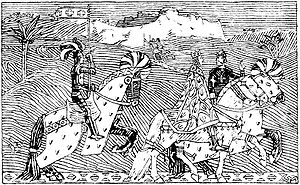Siege of Sidon (1110)
| Siege of Sidon | |||||||||
|---|---|---|---|---|---|---|---|---|---|
| Part of the Norwegian Crusade | |||||||||
 King Sigurd and King Baldwin ride from Jerusalem to the river Jordan by Gerhard Munthe. |
|||||||||
|
|||||||||
| Belligerents | |||||||||
|
|
|||||||||
| Commanders and leaders | |||||||||
|
|
|||||||||
| Strength | |||||||||
|
Norwegians
Franks
Venetians
|
Fatimids
|
||||||||
| Casualties and losses | |||||||||
| unknown, but probably minor | unknown, but probably large | ||||||||
The Siege of Sidon was an event in the aftermath of the First Crusade. The coastal city of Sidon was captured by the forces of Baldwin I of Jerusalem and Sigurd I of Norway, with assistance from the Ordelafo Faliero, Doge of Venice.
In the summer of 1110 a Norwegian fleet of 60 ships arrived in the Levant under the command of King Sigurd. Arriving in Acre he was received by Baldwin I, King of Jerusalem. Together they made a journey to the river Jordan, after which Baldwin asked for help in capturing Muslim-held ports on the coast. Sigurd's answer was that "they had come for the purpose of devoting themselves to the service of Christ", and accompanied him to take the city of Sidon, which had been re-fortified by the Fatimids in 1098.
Baldwin's army besieged the city by land, while the Norwegian came by sea. A naval force was needed to prevent assistance from the Fatimid fleet at Tyre. Repelling it was however only made possible with the fortunate arrival of a Venetian fleet. The city fell after 47 days.
The Icelandic skald Einarr Skúlason gives the following account.
By order of Baldwin and the Patriarch of Jerusalem, Ghibbelin of Arles, a splinter was taken off the holy cross and given to Sigurd.
The Lordship of Sidon was created and given to Eustace Grenier, later a constable of the Kingdom of Jerusalem.
...
Wikipedia
